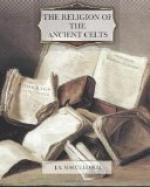loss must have occurred before 1000 B.C. But
after the separation of the Goidelic group a further
change took place. Goidels preserved the sound
represented by
qu, or more simply by
c
or
ch, but this was changed into
p by
the remaining continental Celts, who carried with them
into Gaul, Spain, Italy, and Britain (the Brythons)
words in which
q became
p. The
British
Epidii is from Gaulish
epos,
“horse,” which is in Old Irish
ech
(Lat.
equus). The Parisii take their name
from
Qarisii, the Pictones or Pictavi of Poictiers
from
Pictos (which in the plural
Pidi
gives us “Picts"), derived from
quicto.
This change took place after the Goidelic invasion
of Britain in the tenth century B.C. On the other
hand, some continental Celts may later have regained
the power of pronouncing
q. In Gaul the
q of
Sequana (Seine) was not changed
to
p, and a tribe dwelling on its banks was
called the Sequani. This assumes that Sequana
was a pre-Celtic word, possibly Ligurian.[25] Professor
Rh[^y]s thinks, however, that Goidelic tribes, identified
by him with Caesar’s Celtae, existed in Gaul
and Spain before the coming of the Galli, and had
preserved
q in their speech. To them we
owe Sequana, as well as certain names with
q
in Spain.[26] This at least is certain, that Goidelic
Celts of the
q group occupied Gaul and Spain
before reaching Britain and Ireland. Irish tradition
and archaeological data confirm this.[27] But whether
their descendants were represented by Caesar’s
“Celtae” must be uncertain. Celtae
and Galli, according to Caesar, were one and the same,[28]
and must have had the same general form of speech.
The dialects of Goidelic speech—Irish,
Manx, Gaelic, and that of the continental Goidels—preserved
the q sound; those of Gallo-Brythonic speech—Gaulish,
Breton, Welsh, Cornish—changed q
into p. The speech of the Picts, perhaps
connected with the Pictones of Gaul, also had this
p sound. Who, then, were the Picts?
According to Professor Rh[^y]s they were pre-Aryans,[29]
but they must have been under the influence of Brythonic
Celts. Dr. Skene regarded them as Goidels speaking
a Goidelic dialect with Brythonic forms.[30] Mr. Nicholson
thinks they were Goidels who had preserved the Indo-European
p.[31] But might they not be descendants of
a Brythonic group, arriving early in Britain and driven
northwards by newcomers? Professor Windisch and
Dr. Stokes regard them as Celts, allied to the Brythons
rather than to the Goidels, the phonetics of their
speech resembling those of Welsh rather than Irish.[32]




